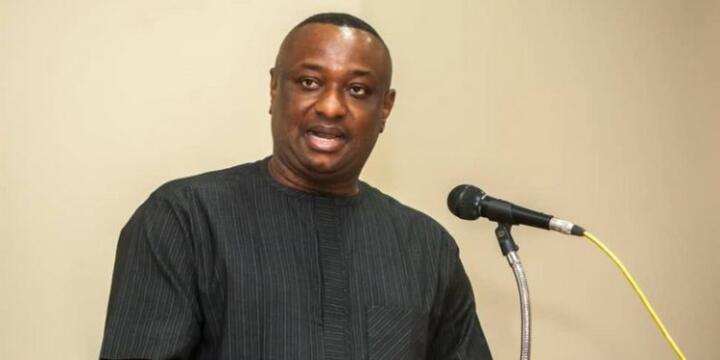Amid mounting public scrutiny, Nigeria’s Minister of Aviation and Aerospace Development, Festus Keyamo, has firmly defended the federal government’s decision to allocate a staggering ₦712 billion for the redevelopment of Terminal 1 of the Murtala Muhammed International Airport (MMIA), Lagos. The project, which received Federal Executive Council (FEC) approval, has sparked intense debate across political, economic, and civil society circles, with many questioning the size of the budget and the urgency of the overhaul.
At a press briefing in Abuja, Keyamo addressed the growing criticism, explaining that the decision to embark on a comprehensive reconstruction of Terminal 1 stems from the airport’s current state of disrepair and its critical importance in Nigeria’s aviation landscape. According to him, the terminal, which was originally commissioned in 1979, has long outlived its structural and operational capacity.

“MMIA Terminal 1 has become a shadow of itself,” Keyamo said. “Escalators no longer function properly, baggage handling systems are obsolete, and passengers are subjected to severe congestion and infrastructural decay. It is no longer feasible to patch up the structure. We must rebuild it from the ground up.”
He emphasized that the terminal will be entirely redesigned and stripped down to its skeletal frame, with modern aviation technology and smart systems integrated throughout the facility. The plan also includes extensive reconstruction of wings D and E, improved passenger flow infrastructure, and new access bridges to ease vehicular movement into the terminal.
Keyamo was quick to highlight that the ₦712 billion figure was not arbitrarily chosen but was based on rigorous benchmarking and evaluation by the Bureau of Public Procurement (BPP), which scrutinized every line item before giving its nod. He challenged critics to compare the cost of similar airport projects in Africa and other regions to gain perspective.
“In Angola, Ethiopia, and even closer in Ghana, modern airport terminals cost billions of dollars to construct. What we are doing is not out of sync with global standards,” he said.
The minister also clarified that the project will not involve any form of foreign borrowing. Instead, it is being funded through the Renewed Hope Infrastructure Development Fund, a government initiative supported by savings from fuel subsidy removal and the exchange rate unification policy. He reiterated that the entire project is financed with domestic funds, and no loan is being secured to fund the revamp.
One of the key justifications provided for the project is MMIA’s revenue-generating potential. Keyamo revealed that the airport currently generates over ₦200 billion annually, which, in his words, makes the investment economically viable and recoverable within a relatively short period.
“With improved infrastructure and passenger experience, revenue could grow even higher. This is not a cost; it is an investment in our nation’s future,” he stated.
The minister also addressed concerns regarding the underutilization of other international terminals, such as those in Port Harcourt, Kano, and Abuja. Critics argue that the funds could have been distributed to enhance those underused facilities instead. However, Keyamo dismissed these concerns, stating that Lagos remains the busiest and most overstretched airport in Nigeria and deserves urgent attention.
“Lagos handles the bulk of Nigeria’s international traffic. Delays, inefficiencies, and poor infrastructure here affect our entire aviation profile and even discourage foreign airlines from maintaining or expanding operations in Nigeria. Fixing Lagos is not about favoritism—it’s about necessity,” he said.
He warned that without decisive intervention, Nigeria could risk losing key international routes as airlines seek safer, more efficient hubs elsewhere. Already, some have expressed concerns over operational risks at MMIA, including inadequate safety infrastructure and poor passenger handling.
In response to questions about transparency and accountability, Keyamo assured Nigerians that there would be open access to the project’s progress. He promised that journalists, civil society groups, and members of the National Assembly would be invited for routine site inspections throughout the construction phase. He said this measure would ensure that the project meets quality standards and is not compromised by corruption or poor execution.
“We are building this for Nigeria, not for any private interest. And because the funding is coming from within, we owe it to the people to be accountable,” he noted.
Despite the reassurances, criticism continues to pour in from various quarters. The African Democratic Congress (ADC) and other opposition voices have labelled the budget “extravagant,” questioning whether such an amount could have been better spent on hospitals, roads, or education.
However, Keyamo insists that aviation is a key pillar of national development and economic diversification. By modernizing Nigeria’s busiest international gateway, he argues, the government is laying the foundation for improved tourism, trade, and international perception.
As the project moves into implementation, public attention is likely to remain fixed on how the funds are spent and whether the promised transformation materializes. For now, the Minister remains confident that history will justify the decision to invest boldly in Nigeria’s aviation future.
Support InfoStride News' Credible Journalism: Only credible journalism can guarantee a fair, accountable and transparent society, including democracy and government. It involves a lot of efforts and money. We need your support. Click here to Donate
